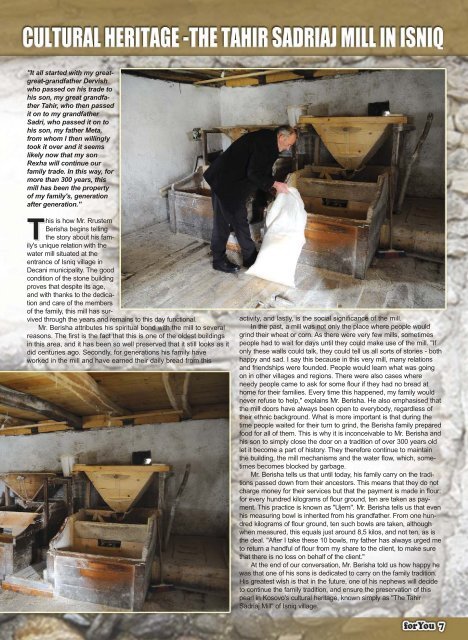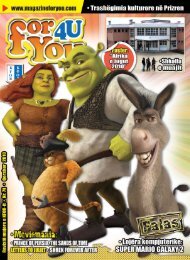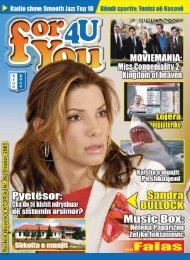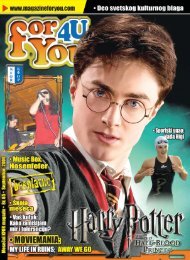You also want an ePaper? Increase the reach of your titles
YUMPU automatically turns print PDFs into web optimized ePapers that Google loves.
"It all started with my greatgreat-grandfather<br />
Dervish<br />
who passed on his trade to<br />
his son, my great grandfather<br />
Tahir, who then passed<br />
it on to my grandfather<br />
Sadri, who passed it on to<br />
his son, my father Meta,<br />
from whom I then willingly<br />
took it over and it seems<br />
likely now that my son<br />
Rexha will continue our<br />
family trade. In this way, for<br />
more than 300 years, this<br />
mill has been the property<br />
of my family's, generation<br />
after generation."<br />
This is how Mr. Rrustem<br />
Berisha begins telling<br />
the story about his family's<br />
unique relation with the<br />
water mill situated at the<br />
entrance of Isniq village in<br />
Decani municipality. The good<br />
condition of the stone building<br />
proves that despite its age,<br />
and with thanks to the dedication<br />
and care of the members<br />
of the family, this mill has survived<br />
through the years and remains to this day functional.<br />
Mr. Berisha attributes his spiritual bond with the mill to several<br />
reasons. The first is the fact that this is one of the oldest buildings<br />
in this area, and it has been so well preserved that it still looks as it<br />
did centuries ago. Secondly, for generations his family have<br />
worked in the mill and have earned their daily bread from this<br />
activity, and lastly, is the social significance of the mill.<br />
In the past, a mill was not only the place where people would<br />
grind their wheat or corn. As there were very few mills, sometimes<br />
people had to wait for days until they could make use of the mill. "If<br />
only these walls could talk, they could tell us all sorts of stories - both<br />
happy and sad. I say this because in this very mill, many relations<br />
and friendships were founded. People would learn what was going<br />
on in other villages and regions. There were also cases where<br />
needy people came to ask for some flour if they had no bread at<br />
home for their families. Every time this happened, my family would<br />
never refuse to help," explains Mr. Berisha. He also emphasised that<br />
the mill doors have always been open to everybody, regardless of<br />
their ethnic background. What is more important is that during the<br />
time people waited for their turn to grind, the Berisha family prepared<br />
food for all of them. This is why it is inconceivable to Mr. Berisha and<br />
his son to simply close the door on a tradition of over 300 years old<br />
let it become a part of history. They therefore continue to maintain<br />
the building, the mill mechanisms and the water flow, which, sometimes<br />
becomes blocked by garbage.<br />
Mr. Berisha tells us that until today, his family carry on the traditions<br />
passed down from their ancestors. This means that they do not<br />
charge money for their services but that the payment is made in flour:<br />
for every hundred kilograms of flour ground, ten are taken as payment.<br />
This practice is known as "Ujem". Mr. Berisha tells us that even<br />
his measuring bowl is inherited from his grandfather. From one hundred<br />
kilograms of flour ground, ten such bowls are taken, although<br />
when measured, this equals just around 8,5 kilos, and not ten, as is<br />
the deal. "After I take these 10 bowls, my father has always urged me<br />
to return a handful of flour from my share to the client, to make sure<br />
that there is no loss on behalf of the client."<br />
At the end of our conversation, Mr. Berisha told us how happy he<br />
was that one of his sons is dedicated to carry on the family tradition.<br />
His greatest wish is that in the future, one of his nephews will decide<br />
to continue the family tradition, and ensure the preservation of this<br />
pearl in Kosovo's cultural heritage, known simply as "The Tahir<br />
Sadriaj Mill" of Isniq village.









